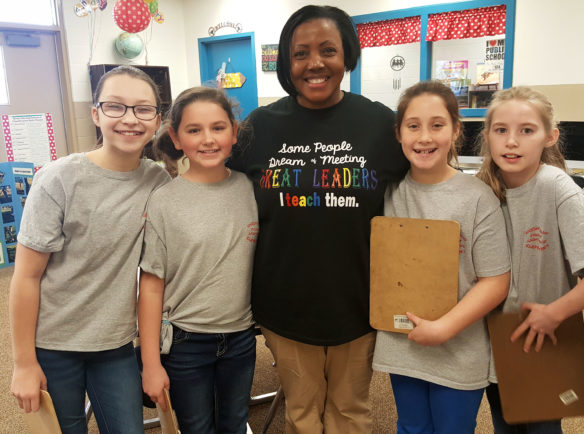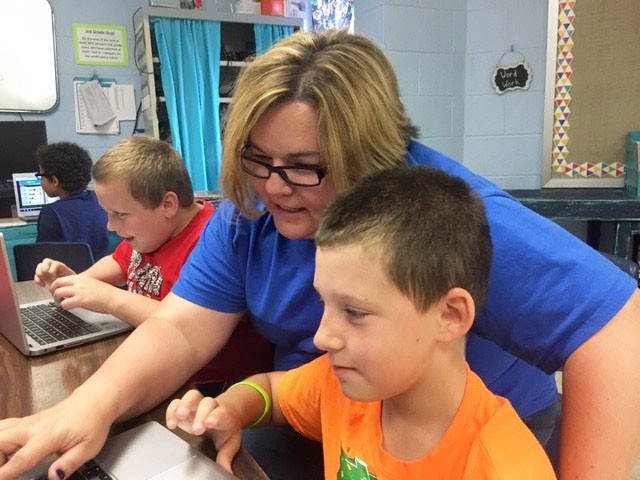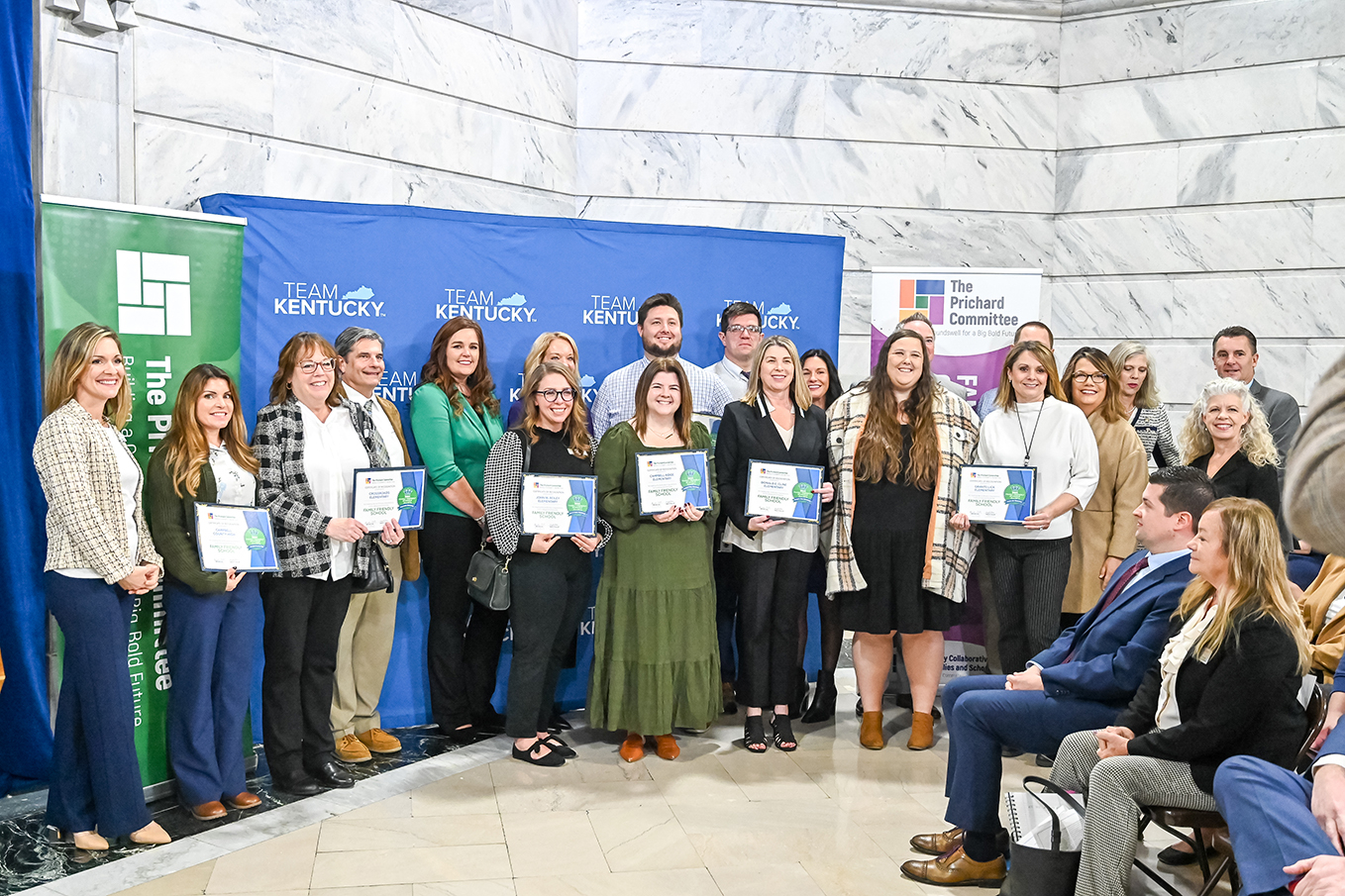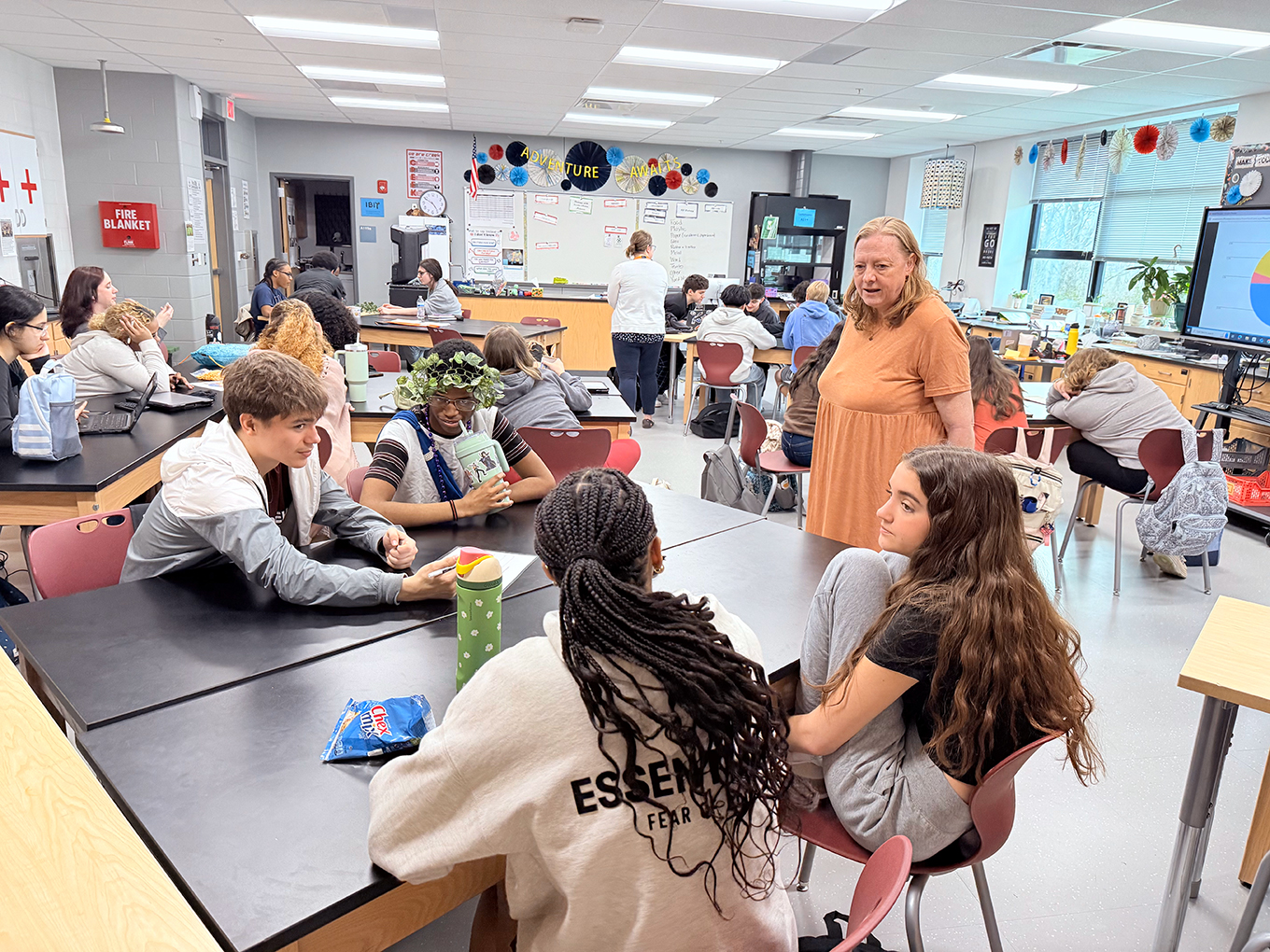
Principal Tamala Howard of Uniontown Elementary School (Union County) snaps a quick picture with 5th-grade students, from left, Evan Logsdon, Olivia Burke, Kaitlyn Thompson and Maggie Baird from the school’s Leader in Me Student Lighthouse Team. Union County was one of 22 school districts to participate in kid·FRIENDLy – Kids Focused, Responsible, Imaginative, Engaged and Determined to Learn – funded by a $41 million Race-to-the-Top-District grant that focused on helping schools build personalized learning and discover ways to empower students.
(Photo submitted)
Student empowerment starts from a powerful premise – that every child possesses unique strengths and has the ability to lead. Schools can be places where all students are empowered to articulate their dreams and aspirations, and believe they are able to lead and become drivers of their own learning.
Personalized learning experiences help empower students to become self-reliant, take initiative and prioritize. Students are better prepared to manage their emotions, be considerate of others and express their viewpoints persuasively. Students can be capable of resolving their own conflicts by finding creative solutions that value differences and develop the skills and self-confidence to lead their lives and succeed in school and beyond.
Student empowerment reinforces a future mindset – a way of thinking innovatively and of resolving issues creatively.
Kentucky is now one of the national leaders in student empowerment due to a $41 million Race-to-the Top-District (RTT-D) grant the U.S. Department of Education awarded in 2013. The grant funded a project between the Green River Regional Educational Cooperative (GRREC) and the Ohio Valley Educational Cooperative (OVEC). Named kid·FRIENDLy – Kids Focused, Responsible, Imaginative, Engaged and Determined to Learn – the project focused on helping 22 Kentucky school districts personalize learning and empower more than 60,000 students in 112 schools.
The 4,000 educators participating in kid·FRIENDLy transformed their classrooms with the goal of preparing students to take initiative, work well in groups, capitalize on technology, solve problems and think strategically. The work is a model for public schools across the nation and gives students a competitive edge in the 21st century workforce.
Twelve cognitive coaches helped more than 350 teachers and school administrators develop instructional strategies that addressed their district’s learning needs, interests, aspirations and the cultural backgrounds of individual students. The coaches helped teachers expand their teaching styles to include differentiated student-centered strategies, visiting the educators both in their classrooms and during planning time. They texted, emailed, called and connected in kid·FRIENDLy’s online learning community.

Rene Thompson, a teacher at Caverna Elementary (Caverna Independent), helps a student with a personalized Google Classroom assignment designed to assist the student with mastery of reading skills. Teacher leaders, engaged in a professional learning community through the kid·FRIENDLy Communities of Practice, developed classrooms that are models of personalized learning.
(Photo submitted)
Teacher leader engaged in a professional learning community through the kid·FRIENDLy Communities of Practice, increased their professional knowledge and skill. They developed classrooms that are models of personalized learning and innovative practice, such as makerspace, project-based learning, Genius Hour and self-paced learning to name only a few. Six leadership mentors, who were former administrators, also provided guidance for current district administration through Community of Learners, a professional learning community for administrators.
Each of the 23 high schools participating in the kid∙FRIENDLy grant have a college and career-readiness counselor (CCRC). These counselors developed a vision of services within their school and district to increase the number of students who reached the benchmark for college and career-readiness.
The counselors now think more deeply about the skills and dispositions students need to become ready for life after high school. The group moved to a theme of “More Than a Benchmark” to define their work. This theme included student skills – such as academic and problem-solving – as well as learning to interact appropriately with adults in real-world settings.
The CCRCs advocated the use of student long-range academic planning through a focus on specific career pathways as early as middle school to help students design a plan to achieve post-secondary and career success. This process developed a vision that is known as Life∙Ready.
The RTT-D grant also provided professional learning for CCRCs centered on growing their knowledge of Life∙Ready best practices, skills and dispositions. The counselors attended regional meetings and visited other high schools to gain insight from each other’s work. Other professional learning included cultural proficiency, researching on-the-job experiences for middle and high school students, and becoming facilitators of the 7 Habits of Highly Effective People and Families program. Family Resource Youth Service Centers used grant funding to remove student barriers and promote life readiness through collaboration with college and career-readiness counselors.
The goal of the program, as one counselor put it, was, “to be the teacher I needed when I was in school.”
Although the goals of the Race-to-the-Top grant were ambitious enough, kid·FRIENDLy went well beyond the K-12 classroom to focus on the Commonwealth’s youngest learners to develop a new partnership with child care providers.
Before the RTT-D grant, many 5-year-olds in the region did not participate in a school-based preschool program or attend a child care program where they could develop the early literacy and numeracy skills essential for success in school. Research has demonstrated that children who attend quality preschool programs are half as likely to be arrested, less likely to repeat grades and more likely to graduate from high school.
Staff at GRREC and OVEC included a plan to significantly increase the number of children who are ready for school. We met 100 percent of our grant goals, which included increasing by 8 percent annually the number of participating students who are kindergarten-ready.
Nine grant-funded Preschool Pals – specialists in early childhood development – identified and built relationships with more than 85 private, faith-based and family-based child care providers in 22 counties. Training sessions for child care staff on using screeners to identify potential developmental delays and giftedness in language, motor, self-help, social-emotional and cognitive skills enhanced teacher ability to prescribe instruction personalized to each child. More than $800,000 has been invested in books, instructional materials and a research-based curriculum for the private providers.
STARS for KIDS NOW (STARS) is Kentucky’s four-star quality-rating system for licensed child care centers and certified family child care homes. Centers receive one to four stars based on an assessment of staff/child ratios, group size, curriculum, parental involvement, training/education of staff, regulatory compliance and personnel practices. The Preschool Pals’ work with child care staff had a direct impact on the STARS rating of each center.
In addition to staff training, kid-FRIENDLy has provided a nationally renowned, research-based curriculum called LiteraSci to each child care provider and assisted with its implementation. LiteraSci includes daily lesson plans for teachers to encourage children to ask questions, develop listening comprehension and vocabulary, integrate literacy and high quality children’s literature into science investigations, and use music to support awareness of the sounds of letters and words.
Being one of the first and largest collective groups to focus on personalized learning, we learned many valuable lessons during this four-year project. One of the most important was that compassion for other educational leaders through listening and understanding was key to our success. The potential of teachers and students alike is limitless and we should never underestimate them.
Also, to ensure the generation of new ideas and improved learning experiences for our students, it is imperative to work collaboratively across all levels of education from the very beginning. Collaboration could be from one educational cooperative to another; grant to grant; district to district; role group to role group; RTT-D district to non RTT-D districts or levels within districts.
Overall, communication is key in making sure each student is successful. Effective communication allows us to inform shareholders of the latest initiatives and activities. It also recognizes the value of listening actively to build positive relationships among stakeholders. Learning from each other and connecting the work is powerful.
Through this process, we became a model for other districts. Seeing district mindsets shift from “I don’t want to” to “I can do this and share with others” is evidenced by everyone working together toward a unified goal of teacher and student empowerment. The RTT-D grant taught us that we must utilize and appreciate the strengths of others.
Throughout the course of the grant period, we learned that a paradigm shift occurred in the participating districts. It used to be that teachers were in charge of the learning, but now the student is in charge of his or her own learning. Student determination is crucial to making the impossible possible.
Lastly, don’t forget to celebrate. Small celebrations along the way invigorate the progress.
A repository of tools and resources intended open to all educators has been developed and will be made available on the GRREC and OVEC websites.
Meg Crittenden is a mentor for the Race-to-the-Top college and career readiness counselors. She earned her bachelor’s, master’s and rank 1 from Western Kentucky University. She earned her doctorate from Peabody at Vanderbilt University.
Donna Link is the Race-to-the-Top projector director and associate director of the Green River Regional Educational Cooperative. She earned her bachelor’s and master’s degrees at Western Kentucky University, as well as her rank 1.




Leave A Comment